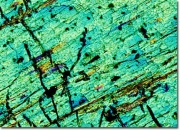Pyroxene
Revision as of 12:19, 27 April 2013 by (username removed)
Description
One of the major classes of silicate minerals. Pyroxenes, in general, a series of doubly hydrated silicates usually containing either calcium, magnesium, or iron. They are distinguished from amphiboles, a second major class, by their cleavage planes. Amphiboles have cleavage angles of 56 and 124 degrees while pyroxenes have cleavage angles of 5 and 93 degrees. Pyroxenes are commonly found in both igneous and metamorphic rocks. Examples of some augite, enstatite, diopside, pyroxenite, jadeite, spudomene, and rhodonite.
Synonyms and Related Terms
pyroxenite; Pyroxen (Deut.); piroxeno (Esp.);pyroxne (Fr.); pyroxenen (Ned.); pirokseny (Pol.); piroxena (Port.); pyroxeen (Ned.)
Authority
- Random House, Random House, Webster's Encyclopedic Unabridged Dictionary of the English Language, Grammercy Book, New York, 1997
- R.F.Symmes, T.T.Harding, Paul Taylor, R.F.Symmes, T.T.Harding, Paul Taylor, Rocks, Fossils and Gems, DK Publishing, Inc., New York City, 1997
- The American Heritage Dictionary or Encarta, via Microsoft Bookshelf 98, Microsoft Corp., 1998
- Wikipedia, the free encyclopedia, at http://www.wikipedia.com Comment: http://en.wikipedia.org/wiki/Pyroxene (Accessed Nov. 9, 2005)
